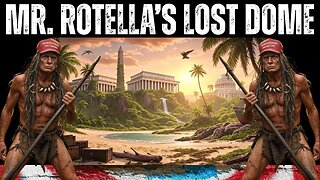Premium Only Content

What are INDIGENOUS PEOPLE?
✪✪✪✪✪
http://www.theaudiopedia.com
✪✪✪✪✪
What does INDIGENOUS PEOPLE mean? INDIGENOUS PEOPLE meaning - INDIGENOUS PEOPLE definition - INDIGENOUS PEOPLE explanation. What is the meaning of INDIGENOUS PEOPLE? What is the definition of INDIGENOUS PEOPLE? What does INDIGENOUS PEOPLE stand for? What is INDIGENOUS PEOPLE meaning? What is INDIGENOUS PEOPLE definition?
Indigenous people, aboriginal people, or native people, are groups protected in international or national legislation as having a set of specific rights based on their linguistic and historical ties to a particular territory, their cultural and historical distinctiveness from other populations. The legislation is based on the conclusion that certain indigenous people are vulnerable to exploitation, marginalization, oppression, forced assimilation, and genocide by nation states formed from colonizing populations or by politically dominant, different ethnic groups.
A special set of political rights in accordance with international law have been set forth by international organizations such as the United Nations, the International Labour Organization and the World Bank. The United Nations has issued a Declaration on the Rights of Indigenous Peoples to guide member-state national policies to collective rights of indigenous people—such as culture, identity, language, and access to employment, health, education, and natural resources. Estimates put the total population of indigenous peoples from 220 million to 350 million.
A defining characteristic for an indigenous group is that it has preserved traditional ways of living, such as present or historical reliance upon subsistence-based production (based on pastoral, horticultural and/or hunting and gathering techniques), and a predominantly non-urbanized society. Not all indigenous groups share these characteristics. Indigenous societies may be either settled in a given locale/region or exhibit a nomadic lifestyle across a large territory, but are generally historically associated with a specific territory on which they depend. Indigenous societies are found in every inhabited climate zone and continent of the world.
Indigenous peoples are increasingly faced with threats to their sovereignty, environment, and access to natural resources. Examples of this can be the deforestation of tropical rainforests where several of the native tribe's subsistence and their normal lifestyle are threatened. Assimilative colonial policies resulted in ongoing issues related to aboriginal child protection.
-
 2:24
2:24
The Audiopedia
1 year agoWhat is AUSTERITY?
83 -
 8:31
8:31
MattMorseTV
1 day ago $1.48 earnedTexas just did the IMPOSSIBLE.
64.1K83 -
 LIVE
LIVE
Rotella Games
18 hours agoGreen Hell Day 6 | We Have a LONG Way to Go
178 watching -
 LIVE
LIVE
Lofi Girl
2 years agoSynthwave Radio 🌌 - beats to chill/game to
229 watching -
 41:26
41:26
The Mel K Show
5 hours agoMel K & Clay Clark | Financial Success Hides Behind Self Discipline: Five Pillars | 8-24-25
31.9K3 -
 LIVE
LIVE
The Rabble Wrangler
13 hours agoThe Best in the West Plays Battlefield 2042 | Road to BF6 Grind
31 watching -
 2:29:17
2:29:17
JTtheSG
2 hours agoLIVE Replay - Back To The Deadzone!!!
13.8K -
 LIVE
LIVE
The Official Steve Harvey
13 days ago $5.14 earned24 HOURS OF MOTIVATION w/ STEVE HARVEY
259 watching -
 25:56
25:56
DeVory Darkins
23 hours ago $0.86 earnedTrump drops ULTIMATE BOMB on Democrat Mayors as ICE makes SHOCKING Announcement
52K184 -
 3:36:30
3:36:30
TonYGaMinG
7 hours ago🟢 ABI WITH FRIENDS | 🍩JOE DONUTS | 😶 🌫 VLADSGAMINGCARTEL |
28.1K4